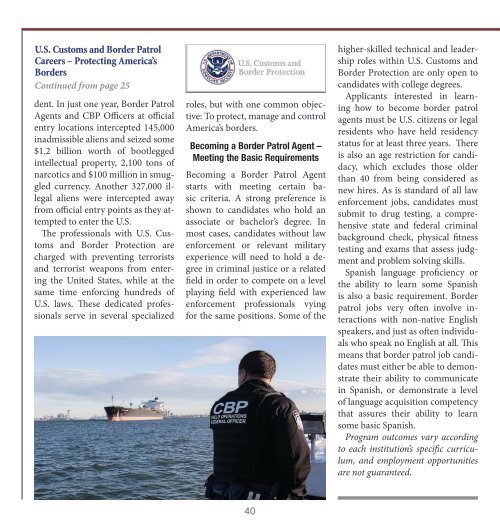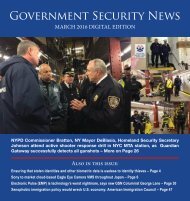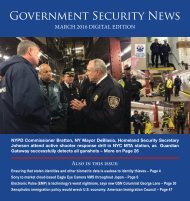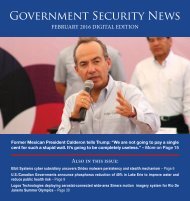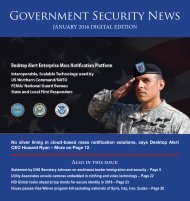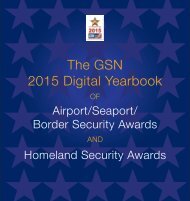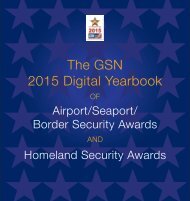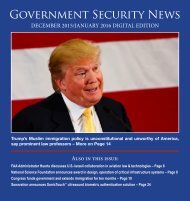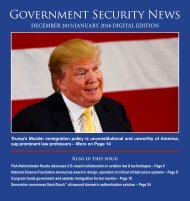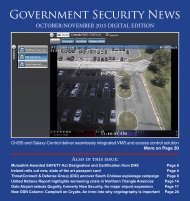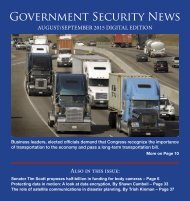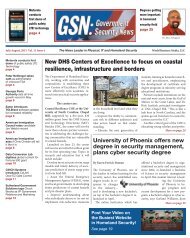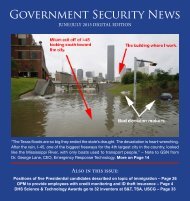GSN Digital Edition April 2016
You also want an ePaper? Increase the reach of your titles
YUMPU automatically turns print PDFs into web optimized ePapers that Google loves.
U.S. Customs and Border Patrol<br />
Careers – Protecting America’s<br />
Borders<br />
Continued from page 25<br />
dent. In just one year, Border Patrol<br />
Agents and CBP Officers at official<br />
entry locations intercepted 145,000<br />
inadmissible aliens and seized some<br />
$1.2 billion worth of bootlegged<br />
intellectual property, 2,100 tons of<br />
narcotics and $100 million in smuggled<br />
currency. Another 327,000 illegal<br />
aliens were intercepted away<br />
from official entry points as they attempted<br />
to enter the U.S.<br />
The professionals with U.S. Customs<br />
and Border Protection are<br />
charged with preventing terrorists<br />
and terrorist weapons from entering<br />
the United States, while at the<br />
same time enforcing hundreds of<br />
U.S. laws. These dedicated professionals<br />
serve in several specialized<br />
roles, but with one common objective:<br />
To protect, manage and control<br />
America’s borders.<br />
Becoming a Border Patrol Agent –<br />
Meeting the Basic Requirements<br />
Becoming a Border Patrol Agent<br />
starts with meeting certain basic<br />
criteria. A strong preference is<br />
shown to candidates who hold an<br />
associate or bachelor’s degree. In<br />
most cases, candidates without law<br />
enforcement or relevant military<br />
experience will need to hold a degree<br />
in criminal justice or a related<br />
field in order to compete on a level<br />
playing field with experienced law<br />
enforcement professionals vying<br />
for the same positions. Some of the<br />
higher-skilled technical and leadership<br />
roles within U.S. Customs and<br />
Border Protection are only open to<br />
candidates with college degrees.<br />
Applicants interested in learning<br />
how to become border patrol<br />
agents must be U.S. citizens or legal<br />
residents who have held residency<br />
status for at least three years. There<br />
is also an age restriction for candidacy,<br />
which excludes those older<br />
than 40 from being considered as<br />
new hires. As is standard of all law<br />
enforcement jobs, candidates must<br />
submit to drug testing, a comprehensive<br />
state and federal criminal<br />
background check, physical fitness<br />
testing and exams that assess judgment<br />
and problem solving skills.<br />
Spanish language proficiency or<br />
the ability to learn some Spanish<br />
is also a basic requirement. Border<br />
patrol jobs very often involve interactions<br />
with non-native English<br />
speakers, and just as often individuals<br />
who speak no English at all. This<br />
means that border patrol job candidates<br />
must either be able to demonstrate<br />
their ability to communicate<br />
in Spanish, or demonstrate a level<br />
of language acquisition competency<br />
that assures their ability to learn<br />
some basic Spanish.<br />
Program outcomes vary according<br />
to each institution’s specific curriculum,<br />
and employment opportunities<br />
are not guaranteed.<br />
40


